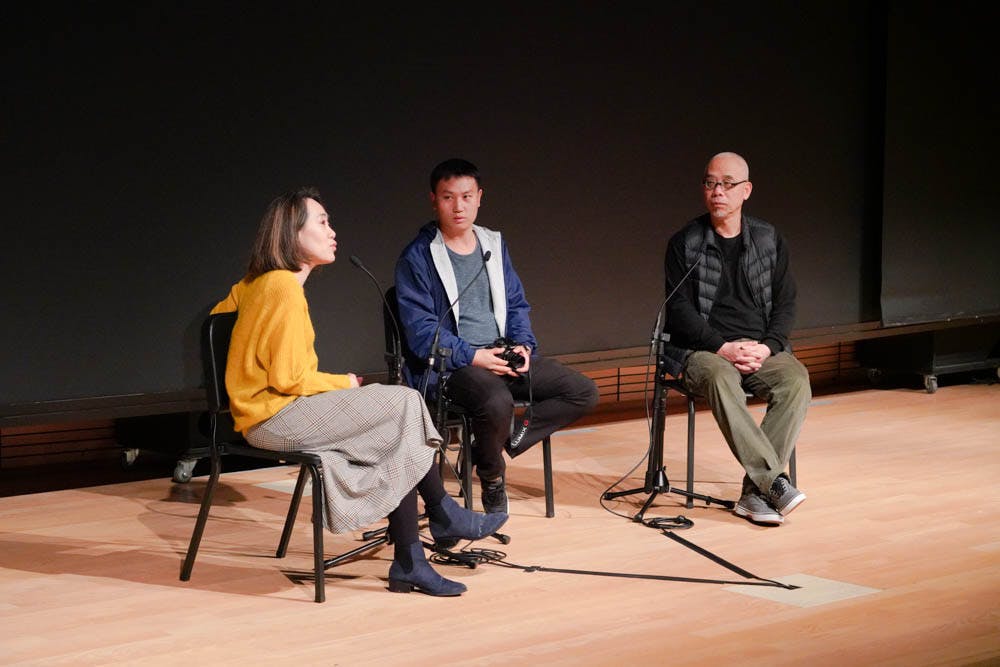A light flickers on in the darkness. A young woman’s face is lit up by the searchlight she holds, casting the room in a warm glow. As she moves forward, turning on more lights, a video plays in the background. An old man is asked to recall his memories, to which he responds: “I can’t talk about the past. I suffered so much.”
This live performance by Zhang Mengqi accompanied a presentation about the Great Chinese Famine from 1959 to 1961 that swept the Chinese countryside and devastated the rural population. The performance was part of an event series held Nov. 4 and 5 at the Granoff Center for the Creative Arts titled “The Art of Unforgetting.” Three documentaries, made by Chinese filmmakers Zhang, Wu Wenguang and Hu Tao, were also shown at the event.
Wu’s “Investigating my Father” and Hu’s “Dumb Men” were shown on Nov. 5. But on Nov. 4 audience members watched a live performance from Zhang and her documentary, “Self-Portrait: Sphinx in 47 KM.” Described by Zhang as a film about “finding the questions we can’t answer,” “Self-Portrait” is an abstract documentary that follows the lives of people in her home village: an old woman going to a river to wash her clothes, a young girl drawing and painting on the walls of her house, a bored teenage boy conversing with his grandparents, a mother recounting the loss of her son.
Jinying Li, the event organizer and assistant professor of modern culture and media, explained that “The Art of Unforgetting” series is “about the relationship between media and memory” and how “memory is a countermeasure against forgetting, against the state’s effort to make people forget.” Especially in the context of modern China, she said that “unforgetting has this political power. When you say ‘unforgetting,’ people will be thinking: ‘Who wants to forget? Who wants you to forget? What’s the power behind forgetting?’”
The three documentaries are also part of the larger Folk Memory Project, an initiative led by Wu that serves as an “oral history archive.” The project was born from Wu’s own dissatisfaction with Chinese media censorship and its obscuration of the past, Wu said during the Monday question-and-answer session. He “wanted to work with (people from the countryside) to find a new energy from them — a new vision, a new idea — for the camera.” Wu added that “the whole process of looking and researching (for the documentary) helps you find the meaning of where you are from.”
The Folk Memory Project involved Wu sending young filmmakers like Zhang and Hu back to their home villages to find a “core” for their work and build a documentary through the relationships they formed. He said that “the memory of the old people is a kind of archive for ordinary history.”
Through a translation from Li, Tao explained that “the collaborative project is also cumulative, as we go back to our villages every year. The more time we spend with them, the stronger our communication is (with the older generation). It builds a huge archive that can yield dramatically surprising results.”
Zhang agreed, expanding on how she first established a relationship with the older generation in her village. “A lot of old people said ‘What’s the point? I talk about my memory, I’m nobody, nobody ever listens to me.’ The important thing is to make them know that they are important people and they are talking about very important experiences. This is not just memory but also history.” In the question-and-answer session, Zhang revealed that her film took seven years to make, with return visits to her village each year.
Jared Ong ’23, who attended Zhang’s screening, commented that “the rapport and trust between her and the villagers was what made this film brilliantly poignant and emotional for me.” Ong also mentioned his appreciation for the “avant-garde performance art across multiple mediums” that the event series displayed.
The abstract style of the documentaries is also what motivated Li to organize the series. “This is the kind of film that students and faculty won’t be able to see anywhere else,” she said. “We as a faculty have a responsibility to bring it to the campus. It’s a kind of film we think students actually should be exposed to, not just because of the different style and aesthetics but also because they present a different face of China.”
Li hopes that when people see these films, they “don’t think only about it as a piece of art, … but also about the reality and the politics behind it.”





